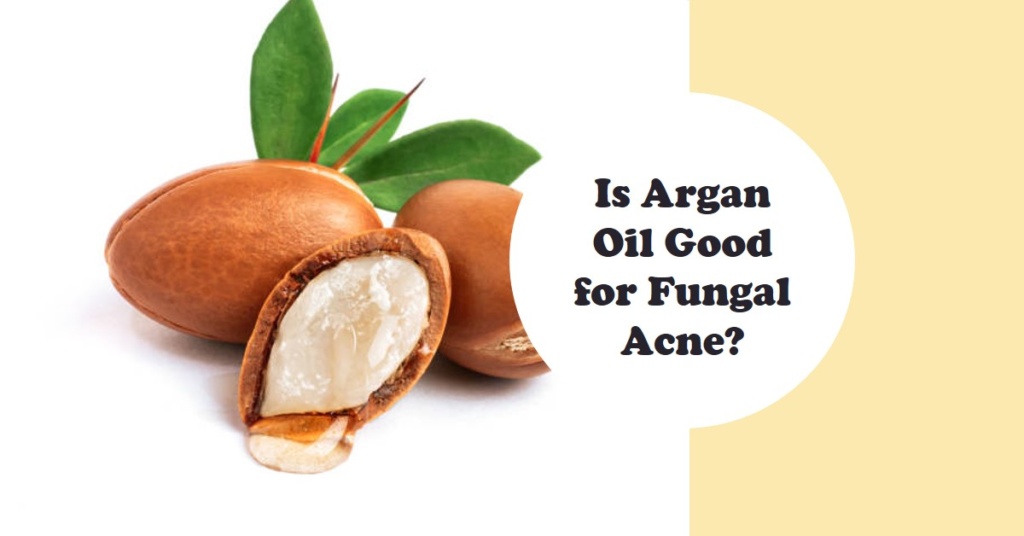Why Argan Oil is Not Suitable for Fungal Acne
Even though argan oil has antioxidant and anti-inflammatory properties due to its balanced fatty acid profile it might not be the best choice when it comes to treating fungal acne, which is caused by the overgrowth of a yeast (Malassezia) on the skin.

I would not use Argan oil for fungal acne
Argan oil has many benefits for skincare but it is not really suitable for fungal acne as it is not an antifungal and it can even make the condition worse.
I love argan oil and use it as an ingredient for many of the skincare products I make (I sell them at the market) but I would never recommend it to my clients for fungal acne.
For fungal acne you need antifungal treatments which would take care of the overgrowth of the yeast. Treatments could include creams that are antifungal as well as oral medication in some cases.
I recommend you give natural options like aloe vera, tea tree oil, apple cider vinegar, green tea extract, neem oil, which hazel, calendula, chamomile and turmeric a try (more on these below).
If you wanted to moisturize with an oil, I recommend you use squalane oil for fungal acne as it is a lightweight, non-comedogenic oil that doesn’t feed the fungi causing the acne.
I am a certified natural skincare formulator and beauty technician, I write about natural ingredients for skin, skincare and more. Check my About page.
If you suspect you have fungal acne, it is best to consult with a dermatologist for a proper diagnosis and treatment plan tailored to your specific needs.
Reasons why people might think argan oil is good for fungal acne
These are the reasons I think you might have thought that argan oil was good for acne (perhaps):
- Curiosity: you may have heard about argan oil’s potential benefits for skin and might be curious to know if it could help with fungal acne.
- Misconception: Perhaps you don’t have a clear understanding of the difference between fungal acne and regular acne, and so you thought argan oil could be helpful, as it is for regular acne.
- Love for natural remedies: This would have been me.If you prefer natural or home-based remedies over conventional treatments you might found it interesting to explore the potential of certain oils for treating fungal acne.
- Versatility: Argan oil is known for its versatility in addressing various skin issues, and maybe you wondered if it could be beneficial for fungal acne as well.
- Personal recommendations: Perhaps you were recommended this oil by a friend or saw it in some online platform and want to verify if it is effective or not.
Let’s have a closer look at why argan oil is not suitable for fungal acne
Fungal acne, also known as Malassezia folliculitis or pityrosporum folliculitis, is a skin condition caused by an overgrowth of yeast (Malassezia) on the skin. Proper treatment is crucial for managing fungal acne and preventing further complications. This article will explore in detail why argan oil, a popular natural skincare ingredient, is not suitable for treating fungal acne, backed by scientific research.
About Argan Oil
Composition
Argan oil is derived from the nuts of the Argan tree (Argania spinosa), which are native to Morocco.
The oil is rich in various components, including:
- Fatty acids: Oleic acid, linoleic acid, and smaller amounts of other fatty acids
- Antioxidants: Polyphenols, carotenoids, and ferulic acid
- Vitamin E: A fat-soluble vitamin with antioxidant properties
- Other nutrients: Squalene, sterols, and triterpenoids
Benefits of Argan Oil for the Skin
Argan oil skin benefits include:
- Moisturizing: It deeply nourishes and hydrates the skin
- Anti-inflammatory: It may help reduce inflammation and soothe irritated skin
- Antioxidant properties: It protects the skin from free radical damage and oxidative stress
- Potential uses for skin conditions: Argan oil has been shown to benefit various skin issues, including dryness, eczema, and psoriasis
Causes of Fungal Acne
Fungal acne is caused by an overgrowth of Malassezia yeast on the skin. This yeast is a part of the normal skin microbiome but can cause problems when it grows excessively.
Several factors can contribute to the development of fungal acne, such as:
- Imbalance of skin microbiome: Disruptions in the balance of bacteria and fungi on the skin can lead to fungal overgrowth
- Excessive oil production: Excess sebum can provide a conducive environment for yeast growth
- Hormonal fluctuations: Changes in hormone levels can impact oil production and skin microbiome balance
- Weakened immune system: A compromised immune system may be less effective at controlling Malassezia overgrowth
Why Argan Oil is Not Suitable for Fungal Acne
1. Lack of Antifungal Properties
Although argan oil possesses various skin-beneficial properties, scientific research has not demonstrated any significant antifungal activity. As fungal acne requires antifungal treatments to manage yeast overgrowth effectively, argan oil is not an appropriate choice for this purpose.
2. Potential Exacerbation of Fungal Acne
Argan oil’s fatty acid composition may contribute to the exacerbation of fungal acne. Malassezia yeast is known to metabolize certain fatty acids, particularly those with carbon chain lengths of 12 to 24. Argan oil contains oleic and linoleic acids, which can potentially promote yeast growth and worsen fungal acne symptoms.
Alternative Treatments for Fungal Acne
Instead of argan oil, consider using treatments specifically designed for fungal acne, such as:
- Topical antifungal creams: Over-the-counter or prescription creams that target yeast overgrowth
- Antifungal shampoos: Shampoos containing active ingredients like ketoconazole or selenium sulfide to manage fungal acne on the scalp
- Oral antifungal medications: Prescription medications for more severe or persistent cases
- Natural remedies with antifungal properties: Some natural ingredients, such as tea tree oil, neem oil, and apple cider vinegar, have demonstrated antifungal properties and may help manage fungal acne
You can read my article on choosing the right cleansers for fungal acne.
Last words
As we have seen above argan oil has many benefits for skin care but it is not really suitable for fungal acne because it is not really an antifungal and doesn’t have antifungal properties. In fact, it can make the condition worse.
Always consult a dermatologist if in doubt or if you think you might have fungal acne.
